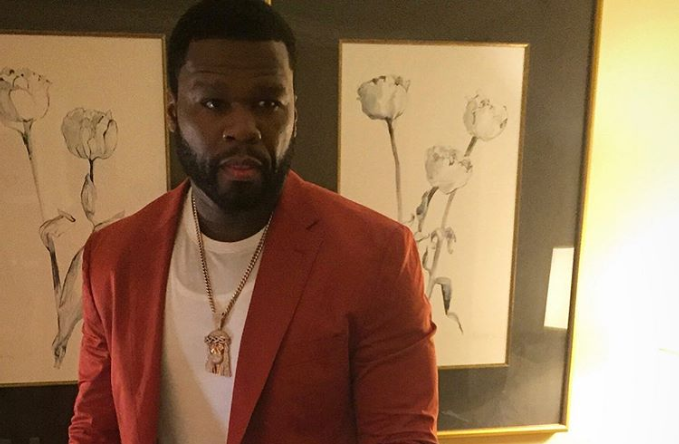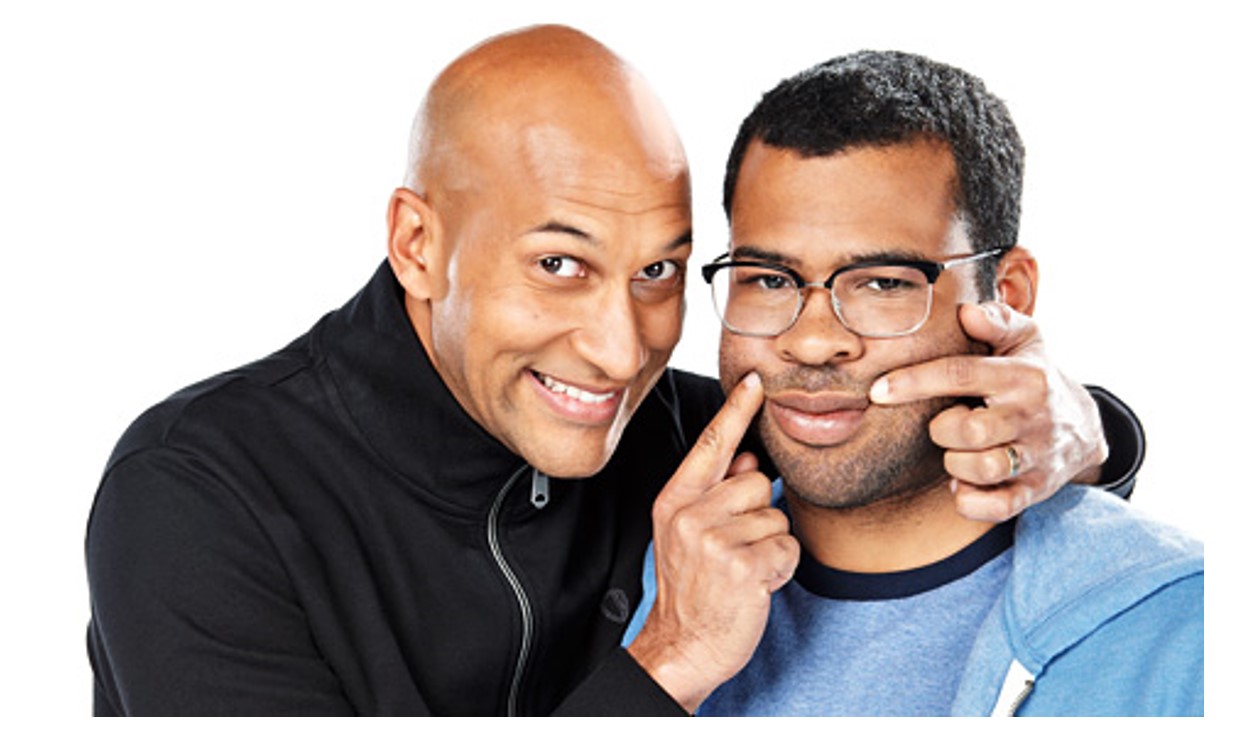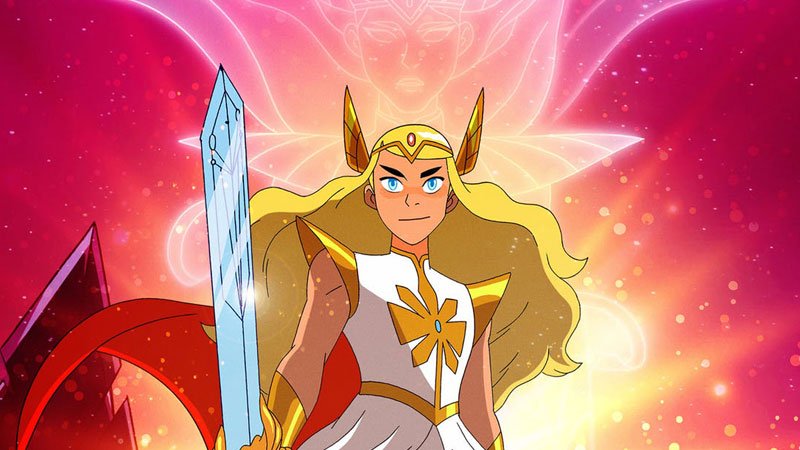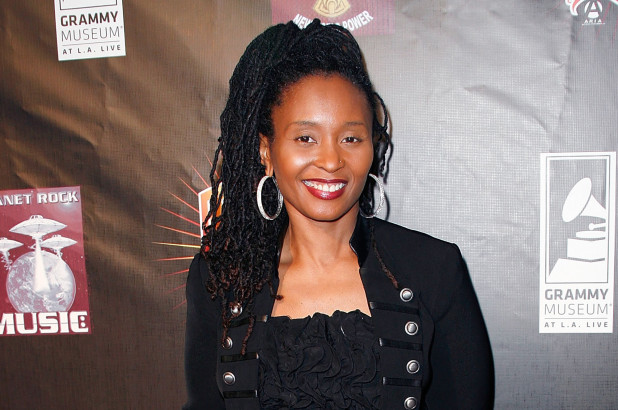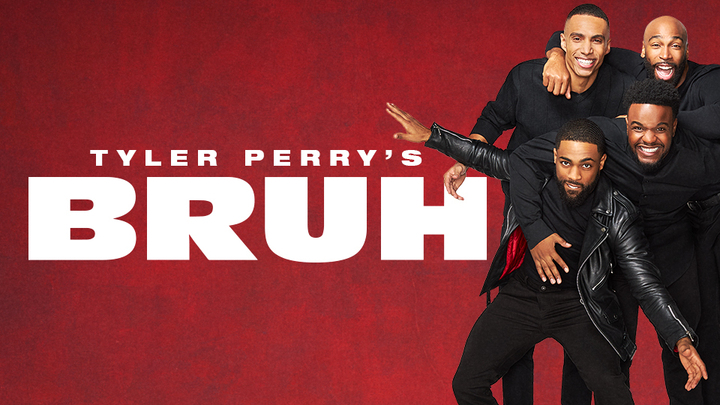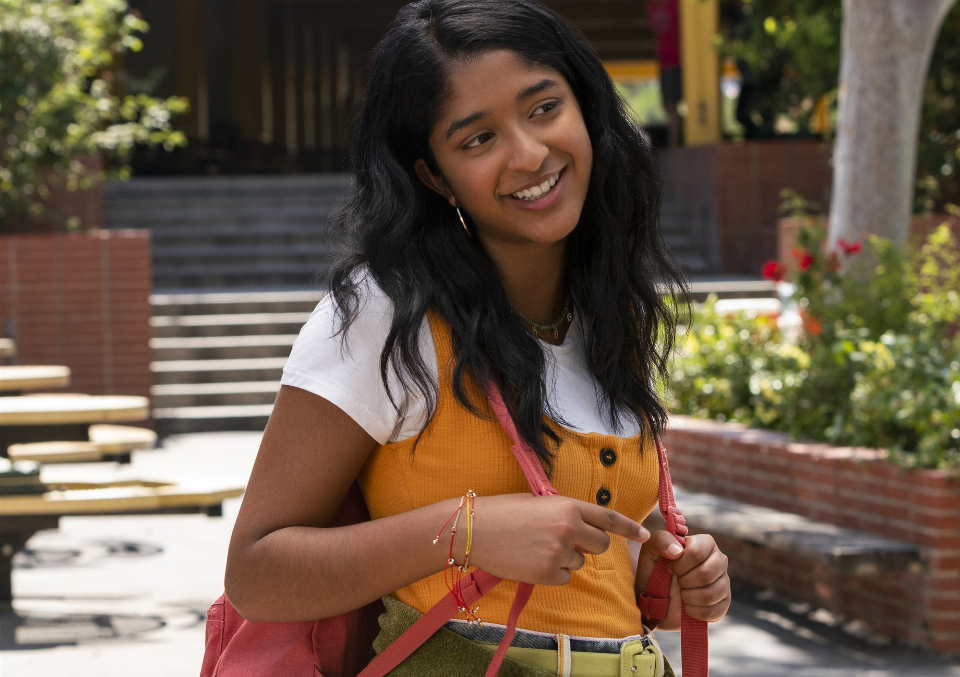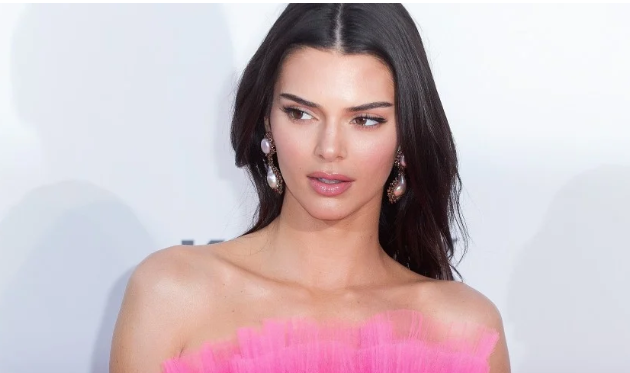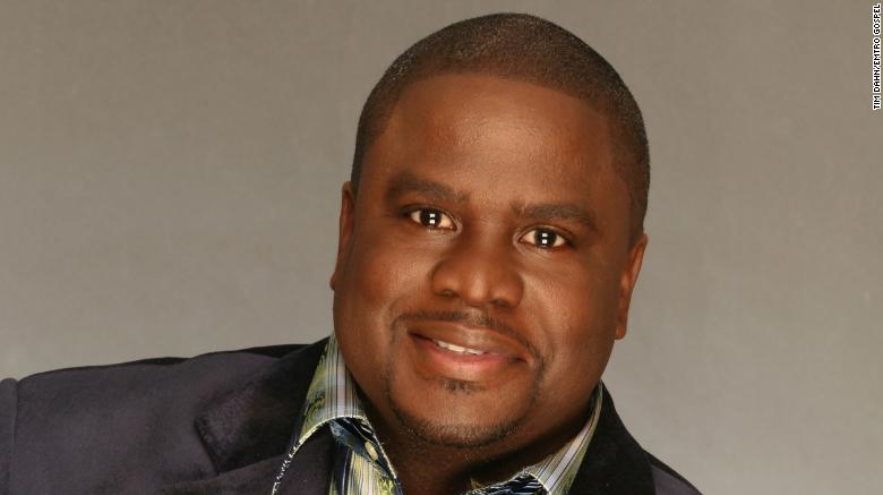50 Cent on His Oldest Son: ‘I Didn’t Think That Success Would Cost Me My Firstborn’
50 Cent spoke with Van Lathan about his new book Hustle Harder, Hustle Smarter on Tuesday night but the conversation would shift to his son, Marquise Jackson.
Fif would detail despite not being in his life, Marquise had everything he didn’t have due to over $1 million in child support.
“It is sad, it’s a sad situation,” 50 said. “When you pray for success, you don’t necessarily pray for the things that come with it. It’s no such thing as success without jealousy without envy or entitlement.
“I didn’t think that success would cost me my firstborn but it’s the situation it is. Like, my grandfather used to say, ‘If it rattles like a snake and slithers like a snake, is it a snake or do you need to be bit?’”
Marquise had some words for 50 last week after the rapper joked about accepting 6ix9ine before his own son.
“I just woke up I had a long day on the Gram yesterday. I didn’t get a chance to hop in the most gangsta live ever,” Marquise said.
He would go on to play the clip where 50 said he would claim Tekashi first.
“Did he just say he would claim a rat?,” Marquise said. “Aw nah, I don’t want no part of that cheese y’all eating over there big fella.”
Article via TheSource
Check out some Lovelyti videos:
50 Cent says he ‘wouldn’t have a bad day’ if son Marquise Jackson was hit by a bus!
Autistic Teen Who Was CLOWNED By 50 CENT SPEAKS OUT
Pioneering Hip-Hop Journalist Dee Barnes Is Now Homeless

Check out Dee Barnes’ GoFundMe campaign here.
Dee Barnes has been evicted from her home after a long financial struggle.
In a new interview, Barnes revealed she’s now homeless. “I had never asked for public help before, but I then remembered a long time ago while I was going through the assault trial in 1991 people were sending me checks for my legal fees. I never cashed any of them — not one — but knowing I had that support kept me strong enough to continue to face each court date,” she told HipHopDx.
She continued, “right now, I am officially homeless. My goal with the campaign is to regain stability, which is imperative for survivors of any trauma.”
Barnes had recently created a GoFundMe explaining her situation.
A post on her account reads, “Standing in our own truth not the definitions or the expectations is powerful, and this is my TRUTH…Yes, I did post the link to my PayPal, CashApp and GooglePay accounts asking for help because I am in the process of being evicted. This page was created as an emergency fund to stop the process and the subsequent legal fees. Even though I am facing extreme financial hardship, I keep my head up. I know who I am, I know my worth and I know I’m not alone.”
As the host of Pump It Up! Barnes became the first female hip-hop journalist to have a broadcast television show. Her career derailed in 1991, after being brutally attacked by Dr. Dre. Barnes filed criminal charges against Dre and a civil suit followed before they settled out of court in 1993.
Dre, who had long dismissed the story, spoke on his history of abusing women during an episode of HBO’s The Defiant Ones, saying he was “out of his fucking mind.” The music mogul referred to abuse as “a major blemish” on who he is as a man.
After the attack, Barnes says she continues to have migraines 28 years later, and believes that she was blackballed by the industry.
“As far as the subject matter of my past history with Dr. Dre and my current situation, I will say any time a women tells her account of abuse from a public figure, there is always extreme backlash,” she said in the interview. “Women are punished first by the crime committed against them and then for holding abusers accountable for their actions and speaking out against domestic violence and sexual assault. Survivors should be able to hold people in positions of power accountable for their actions without losing their own power.”
In 2016, Dre threatened to sue Sony Pictures over the release of the TV movie Surviving Compton: Dre, Suge & Michel’le, which depicted him as a violent abuser to former girlfriend and singer Michel’le.
Michel’le has gone on record with allegations of physical abuse against Dre.
Article via OkayPlayer
Check out some Lovelyti videos:
Twitter GOES OFF On Dr. Dre During The Premiere of Michel’le Biopic Surviving Compton
Michel’le VS Dre~i’m Not Sweating Dre’s Legal Threat My Movie Is STILL Coming out #survivingcompton
Dr. Dre BRAGS About Daughter Getting Into USC ‘All on Her Own,’ Then Remembers $70 Million Donation
‘Tyler Perry’s Bruh’ debuting on BET streaming service May 7
The latest Tyler Perry project is debuting Thursday, May 7, exclusively on the BET+ streaming service. “Bruh” is a dramedy focused on four 30-something friends who have known each other since college.
This is Perry’s second production exclusively for BET+ following the drama “Ruthless” about a woman trapped in a cult.
The first three episodes of “Bruh” will be available at launch. A new show from the 24-episode season will then drop each week after that.
The publicity materials note that “in a society where companionship between men of color is often misjudged and misrepresented, ‘Tyler Perry’s Bruh’depicts a healthy image of black brotherhood; embracing vulnerability without playing on stereotypical hypermasculinity.”
“Bruh” is a slang term popularized in African-American greek culture, referencing friends so close they’re more like brothers.
That is the case for John (Barry Brewer), Tom (Mahdi Cocci), Mike (Phillip Mullings Jr.) and Bill (Monti Washington), who are navigating different career and relationship paths while relying on each other for support. The publicists note: “Sometimes their love is tough and their honesty brutal, but they manage to see each other through every scenario with levity and laughter.”
As usual, this entire season was written by Perry himself. He also directed and executive produced the series at Tyler Perry Studios.
Article via AJC
Maitreyi tackles Desi American teenhood in Mindy Kaling’s new Netflix series
“How has this not happened already?” Maitreyi Ramakrishnan said. “It’s not, you know, some small group of people. For me, being Tamil, we’re all over the world.”
When Maitreyi Ramakrishnan’s friend Shaharah Gaznabbi sent her a screenshot of Mindy Kaling’s tweet calling for South Asian girls to audition for a new Netflix show last year, she said yes. The honest reason, she said, was mostly that she wanted to hang out with her best friend, whom she hadn’t seen in a while.
It turned out that this spontaneous energy made her a good fit for the character, whose impulsiveness sometimes gets her into trouble. Luckily for Ramakrishnan, it helped her land her first acting job — the lead role in Kaling’s and Lang Fisher’s coming-of-age series “Never Have I Ever,” premiering Monday on Netflix.
The show, loosely based on Kaling’s childhood, centers on Devi Vishwakumar, an Indian American high school sophomore who is dealing with the grief of her father’s sudden death while navigating ordinary high school troubles: grades, fitting in and, most important, boys. The comedy is fresh and uniquely Gen Z, incorporating aspects of pop culture like the CW’s “Riverdale” and a knockoff version of TikTok in different scenes.
Reconciling trauma and everyday life is seen through the lens of an Indian American teenager, rebelling against her overprotective mother to go to parties and drink.
It’s one of the first times a South Asian girl’s story has been the center of a U.S. television show. Ramakrishnan, a Tamil Canadian from Mississauga, Ontario, said she’s excited to provide this representation.
“How has this not happened already?” she asked. “It’s not, you know, some small group of people. For me, being Tamil, we’re all over the world.”
She recalls how her spur-of-the-moment audition went down. Ramakrishnan and her friend went to their local library, figured out how to use her mom’s camera and sent in a video. A week later, she was asked to send in four more. Ramakrishnan, who was then 17, had acted in her high school’s theater productions, but she had never held any kind of job before.
“When they asked me to send in more, I honestly thought that they set the bar really low and they had low expectations, so I did not think much of it,” Ramakrishnan, who is now 18, told NBC Asian America. “But a week after that, after sending in four more videos, they asked me to come to L.A. for a screen test. And that’s when me and my best friend lost our minds.”
After auditioning in Los Angeles, Ramakrishnan found out that she had gotten the lead. Ramakrishnan said Kaling told her that her ability to bring herself to the character from the get-go was a major factor in her being chosen among 15,000 other applicants. She was able to give her input into what Devi said and how she reacted to keep the character realistic.
Devi is a bold, nerdy overachiever who desperately wants to shrug off the past year’s trauma and become cool and popular. She enlists her two best friends, Fabiola and Eleanor, in the ploy, picking boyfriends for them and trying to wangle invitations to parties. She tries to distract herself from her father’s recent death by pursuing an older, extremely sought-after boy at her high school.
While Devi’s Indian heritage isn’t necessarily the focus of the series, it’s certainly present in the first season. It can be seen in the Vishwakumar family’s nightly dinners, when they might eat dosa and sambar, and in Devi’s cousin Kamala’s fretting about her parents arranging her marriage.
It’s also apparent in more nuanced ways. Devi’s struggles with her own connection to Indian culture are evident when the family attends the annual Ganesh Puja, a Hindu festival celebrating the god Ganesha. She is visibly uncomfortable wearing a traditional sari, and when she runs into her friend Harish, who has returned from Stanford to attend the puja, she’s surprised to hear that he genuinely wanted to come to the “lame-fest.”
When Devi tells Harish that she can’t wait to move away to college, become an atheist and eat cheeseburgers with a white boyfriend, he says that he used to relate but that his Native American roommate’s connection to his own culture made him reassess. He tells her that even though he used to make fun of the puja every year, he doesn’t want to be an “insecure Indian guy who hates doing Indian things,” and Devi unconvincingly asserts that that’s not how she feels and quickly heads off.
Throughout the episode, Devi seems to feel out of place among the other Indian Americans. She makes fun of a group of girls around her age doing an Indian dance performance and gets scolded by a dancer’s sister. Later during the puja, she talks to a college counselor — the white husband of an auntie — who tells her that without her using her father’s death as a selling point, he doesn’t see how she’s different from other Indian teenagers applying to college.
“I’m not like any other Indian kid, and I’m not interesting just because my dad died,” she says.
Ramakrishnan said she was able to draw on her own experiences as a first-generation South Asian growing up in Canada.
“Like Devi, I had to figure out where I stood with my own culture, and that’s something she goes through in the series,” Ramakrishnan said. “Which is really interesting, because it hasn’t been talked about in film and Western film, being first generation. And now we’re bringing that to light and we’re having that conversation, which is important.”
Ramakrishnan also pulled from her own social circle while playing Devi. In the initial teaser trailer for “Never Have I Ever,” Devi is seen kneeling before several Hindu gods, saying, “What’s poppin’?” Ramakrishnan said the phrase made its way from her group of friends to the show.
“I used to always say that on set, and slowly but surely Mindy and Lang started putting that into the actual script,” Ramakrishnan said.
She was able to finish out high school as a normal student. She found out that she had landed the role in May, graduated in June and began filming in July. At Kaling’s request, she kept the secret for two months, telling only her best friend.
“I really got to live out my high school life normally, getting ready, you know, for prom and commencement, but then just knowing ‘OK , this is going to happen. Get ready,'” Ramakrishnan said.
Ramakrishnan wants to continue to pursue acting. While sheltering in place with her family in Mississauga, she’s reading scripts, looking for more projects to dive into and playing Animal Crossing with her brother and mom.
She said other South Asian girls who want to pursue careers that aren’t seen as traditional in their communities should go for it, because if they don’t, they’ll regret it.
“It’s never too late to pursue something, because no path is ever the right way,” Ramakrishnan said. “There’s no one conventional path to go about doing something.”
Article via NBCNews
Is the ‘fox eye challenge’ racist? Why some Asians are giving the side eye to social media trend popularised by stars like Bella Hadid and Kendall Jenner
Article via SCMP
- The look, with almond-shaped eyes lifted at the outer corners, is inspired by celebrities like Bella Hadid, and tips to recreate the look are popular on TikTok
- Asians have taken to social media to call the trend out for its replication of a facial feature that, growing up, they were bullied for having
The “fox eye challenge” is a social media trend inspired by famous women, including model Bella Hadid and actress Megan Fox, who have almond-shaped eyes lifted at the outer corners to smouldering effect. The trend’s hashtag, #foxeye, has gained more than 10.1 million views on TikTok alone.
Ways to achieve the desired look include shaving off the eyebrows after the arch and redrawing them, and applying a heavy-handed cat eye with eyeliner.Shaving off the end of the brow creates a straight which makes the face appear narrower, while redrawing them with an upwards slant creates the illusion of upturned eyes. Bella Hadid uses thick black liner to make her eyes appear elongated.
Other women use more drastic measures such as brow lifts or thread lifts, in which temporary sutures lift the skin and pull the eyes into the desired shape.
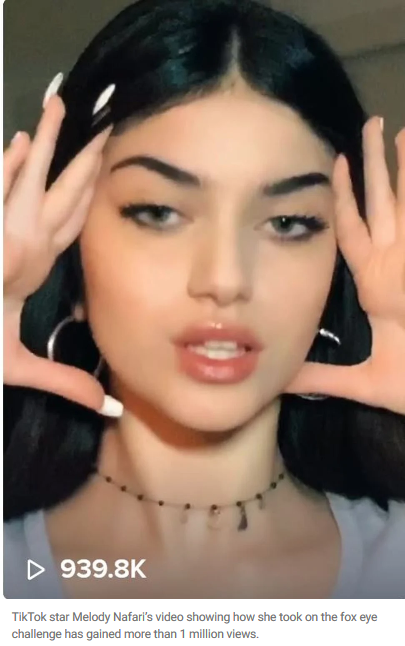
The trick for success, as many videos have pointed out, is to make sure the brow is shaved from the point directly above the outer rim of the pupil, while the winged liner should be drawn at a 45-degree angle.
To complete the look, one can also contour the cheekbones and nose to create a sharper, more pointed face shape.
View this post on Instagram A post shared by mar! (@martincantos) on Dec 11, 2019 at 2:05pm PST
The fox eye look has inspired a popular photo pose, in which people deliberately pull at their eyes with their fingers and smoulder at the camera. The pose has rubbed many the wrong way.
TikTok star Melody Nafari’s (@melodynafarii) video of herself posing in this way has gained more than 1 million views and thousands of comments. Some have come from Asian social media users, such as one calling herself Sheena, who remarked: “I remember when I was in primary [school] people were making fun of Asian eyes doing this, now it’s a trend.”
Asian-American TikTok user Melissa (@chunkysdead) has been vocal about how uncomfortable the trend makes her, explaining that seeing its popularity with Caucasians – who used to pull the same face to mock her for her heritage – was unpleasant.
Just as “dimpleplasty”, a type of plastic surgery used to create dimples on the cheeks, became popular after the angelic big eye-look of Australian model Miranda Kerr was all the rage about five years ago, this look’s popularity has popularised blepharoplasty – plastic surgery that modifies the eyes.
Angelo Tsirbas, an ophthalmologist in Sydney, Australia, told Beautycrew.au that the looks of Kendall Jenner, Hadid and the Kardashians are the ones most requested by his plastic surgery patients.
This slanted-eyes trend may not have deliberately emulated the characteristic Asian feature, but many Asians see it as an act of appropriation that ignores the racism and discrimination many have faced in Western countries and communities.
View this post on Instagram throwback A post shared by Kylie (@kyliejenner) on Mar 22, 2020 at 10:28am PDT They have called the trend out for turning one of their largest childhood insecurities and traumas – their looks – on its head. Where they used to be teased and bullied for their features, how they look is now considered a new standard of beauty.
Kim Hee-jae, a student at University of California, Davis, in the United States said she was mocked in the streets by strangers for her eye shape and called a Chink, an offensive word for a Chinese person. She says that she finds it “amazing how opinion of Asians has changed so swiftly”.
“Is being Asian a trend now? It kind of feels like it is … The fox eye thing itself is probably just an aesthetic, like a beauty trend, not racism. But it doesn’t mean that we [the Asian community] don’t feel slighted. They used to insult us for that.”
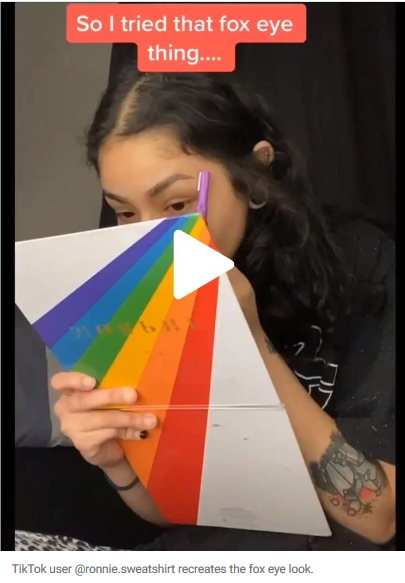
Some Asians view the trend positively. John Son, a second-generation Asian-American high school student, says he feels good that Asians are gaining popularity and are being seen in a positive light.
“I feel like we’ve become the cool kids – we used to want [to be seen as more white] but now it’s the opposite, especially because of social media. So like, in the current generation of teens, everyone is more accepting and we take things as jokes, at face value. We don’t get so pressed.
“Beauty trends are just that. Trends that come and go. We’re all just people underneath it all, and I think people are starting to see that.”
‘The Goonies’ Cast Reunites 35 Years Later Thanks to Josh Gad
The cast of The Goonies reunited for the first time in more than 30 years — courtesy of Frozen star and Goonies superfan Josh Gad — to reflect on their 1985 classic, reenact beloved scenes and truffle shuffle for a good cause. (The reunion is in support of The Center for Disaster Philanthropy‘s ongoing coronavirus efforts.)
Castmembers Sean Astin, Corey Feldman, Martha Plimpton, Josh Brolin and the rest of the gang were joined by “surprise guests” Cyndi Lauper (who sang the movie’s theme), screenwriter Chris Columbus, director Richard Donner and executive producer Steven Spielberg.
Naturally, talk turned to a sequel, with Spielberg teasing future treasure hunts: “Every couple of years, we come up with an idea but then it doesn’t hold water. The problem is the bar that all of you raised on this genre, I don’t think we’ve really successfully been able to find an idea that is better than The Goonies that we all made in the ’80s. Until we do, people are just going to have to look at this one 100 times.”
This reunion is the first of Gad’s weekly YouTube series, Reunited Apart. As for why he chose Goonies to kick it off? “There is one movie that defines my childhood. One movie that defines my personality. One movie that defines me,” he said.
Article via Click2Houston
Facebook will stream a virtual graduation ceremony featuring Oprah and Miley Cyrus
As dates for reopening the country are continually pushed back, virtually every aspect of life has been disrupted. Holidays, birthdays, weddings and funerals have begun to be virtualized in order for attendees to maintain social distances. It’s an inevitability the class of 2020 has no doubt been dreading for months.
Here’s some consolation from Facebook: a virtual graduation ceremony. The social media giant is bringing out some heavy hitters for the event, too. Oprah Winfrey will be giving the commencement address, while Awkwafina, Jennifer Garner, Lil Nas X and Simone Biles will all be giving speech. Miley Cyrus is set to perform.
The event kicks off at 11AM PT/2PM ET on May 15 via the Facebook Watch App. Four days prior, Instagram will start showing daily videos “that spotlights iconic senior experiences — from ‘most likely’ votes to portrait showcases to senior skip day.” The company will also be offering features to host a “virtual graduation ceremony and party” on the site.
Other sites are holding similar events. Also on May 15, Her Campus will host I’m Still Graduating, featuring appearances by Eva Longoria, Radhika Jones, Margaret Cho, Brooke Baldwin, Liam Payne, Jesse McCartney, Andrew Yang and Tamron Hall. Many schools are also planning their own, less star-studded events to celebrate graduations remotely.
It has to be a bit heartbreaking to do all of this stuff through social medium, Zoom and the like. But for the time being, that’s just going to have to be the virtual world we live in.
Article via TechCrunch
Troy Sneed, Grammy-nominated gospel singer, dies from coronavirus complications
Troy Sneed, a Grammy nominated gospel singer and record label founder, has died of complications from Covid-19, his publicist Bill Carpenter confirmed to CNN.Sneed was 52.
Known for gospel radio hits, including “My Heart Says Yes” and “Worked It Out,” Sneed died Monday at a hospital in Jacksonville, Florida.
“Troy was like a brother to me,” Mike Chandler, chief executive officer of Rejoice! Musical Soul Food radio network, said in a statement. “He was a businessman. He was a husband; he was a father. He was an industry leader so it’s not just my loss it’s a loss to the whole industry.”
“He was one of the most talented men in our industry but more importantly Troy was a good person and he did a lot of good work,” Chandler said. “The world is going to miss him.”Born in Perry, Florida, Sneed played football throughout high school and dreamed of playing in the National Football League.But three separate injuries in his junior and senior years cut his dream short and doctors advised him to give up the game.
After graduating from high school, Sneed enrolled at Florida A&M University as an education major with a minor in music. He joined the university choir and became active in gospel music. The school’s gospel choir advisor, Prince J.D. Olds, recognized Sneed’s leadership and musical qualities and appointed him the Minister of Music for the choir. During that period, Sneed traveled with the choir as they performed with gospel luminaries such as James Moore, LaShun Pace, Dorothy Norwood, and the Rev. James Cleveland.After graduating from FAMU, Sneed taught at Jacksonville’s Beach Elementary School until Savoy Records executive Rev. Milton Biggham offered him a position as the Georgia Mass Choir’s Assistant Minister of Music. During his decade-long tenure, Sneed performed and arranged music on their albums and appeared with them in the 1996 film “The Preacher’s Wife,” starring Denzel Washington and Whitney Houston.Youth for Christ’s 1999 album “Higher” earned Sneed a Grammy Award nomination. That same year Sneed released his debut solo gospel album “Call Jesus” on Savoy Records and a follow-up project.
He later decided to go into the business for himself. In 2003, Sneed and his wife, Emily (whom he met at FAMU), formed their own recording label, Emtro (a blend of their first names) and secured national distribution with GoDigi Path. Over the years, Sneed wrote songs and produced projects for a variety of other artists that were released through Emtro, including “Call Jesus” for Bruce Parham and the Arkansas Mass Choir’s hit, “You Alone.” By 2007, Sneed focused on his own music and earned his first Billboard solo Top Ten hit with the upbeat song, “Hallelujah.” He would go on to have a dozen songs place on various Billboard gospel charts. His biggest hits include “My Heart Says Yes” (2011) and “Work It Out” (2008), which both peaked at No. 2 on Billboard’s Hot Gospel Songs chart. His latest album “All My Best” was released last fall and featured twelve of his gospel radio songs.
Sneed is survived by his wife of 27 years and their four children, Troy Jr., Evany, Trey and Tyler.
Article via CNN


